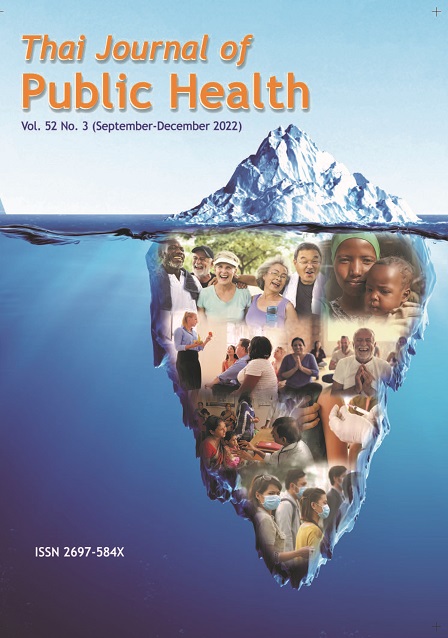Examining the Moderating Role of Self-Construal on Fear Appeal in Preventing Colorectal Cancer
Keywords:
Self-construal, Fear appeal, Extended Parallel Process Model, Colorectal cancer, Fecal immunochemical testAbstract
The congruent effect of a fear appeal message type (self-focused versus family-focused), and cultural orientation (individualist versus collectivist) is believed to be crucial since it increases adaptive outcomes (attitudes and behavioral change). However, the notion has been inconclusive for over a decade. The current study aimed to examine the moderation effect of self-construal on the relationship of different focuses of fear message type and fear appeal outcomes, including perceived threat, fear emotion, attitudes, and intention toward colorectal cancer (CRC) screening. This 3x2 (three types of self-construal priming: independent, relational versus collective self-construal x two types of fear message: self-focused versus family-focused) factorial research study was conducted among 133 high-risk participants aged 40-70 years. The participants were randomly assigned to one of six groups via Qualtrics (online platform) to prime different types of self-construal, before reading either self-focused or family-focused fear-arousing messages that recommended fecal immunochemical test (FIT) to prevent CRC. The between-group MANOVA did not confirm the moderating role of induced self-construal. Nevertheless, moderated mediation analysis using measured self-construal revealed a crucial role of measured self-construal on perceived CRC threat as well as its role on intention of attending a colorectal screening. These findings can be applied to promote cancer screening.
References
Medical Digital Division of National Cancer Institute. Hospital-based cancer registry 2021. Bangkok: National Cancer Institute; 2020. (In Thai)
National Cancer Institute. TCB report online. Available from: http://tcb.nci.go.th/CWEB/cwebBase.do?mode=initialApplication
Thangthum W, Foongfaung S, Phawo P, Thipprasopchock S, Boonprasop S. Promoting health-related quality of life in patients with metastatic colorectal cancer. JOPN 2020; 12(2): 471-78. (In Thai)
Kittrongsiri K, Praditsitthikorn N, Chaikledkaew U, Teerawattananon Y. Economic evaluation of colorectal cancer screening among Thai population. Bangkok: HITAP. 2014. (In Thai)
Witte K. Putting the fear back into fear appeals: The extended parallel process model. Commun Monogr 1992; 59 (4): 329-49.
Markus HR, Kitayama S. Culture and the self: Implications for cognition, emotion, and motivation. Psychol Rev 1991; 98 (2): 224.
Cross SE, Bacon PL, Morris ML. The relational-interdependent self-construal and relationships. J Pers Soc Psychol 2000; 78 (4): 791.
Sampson J, Witte K, Morrison K, Liu WY, Hubbell AP, Murray-Johnson L. Addressing cultural orientations in fear appeals: Promoting AIDS-protective behaviors among Mexican immigrant and African American adolescents and American and Taiwanese college students. J Health Commun 2001; 6 (4): 335-58.
Jansen C, Verstappen R. Fear appeals in health communication: Should the receivers’ nationality or cultural orientation be taken into account? J Intercult Commun Res 2014; 43 (4): 346-68.
Jansen C, van der Kroef G. The impact of receivers’ nationality and cultural orientation on the effects of fear appeals in health communication. J Intercult Commun Res 2019; 48 (1): 72-90.
Hair JF, Black WC, Babin BJ, Anderson RE. Multivariate Data Analysis. 7th ed. Harlow: Pearson Education Limited 2014.
Stapel DA, Van der Zee KI. The self-salience model of other-to-self effects: Integrating principles of self-enhancement, complementarity, and imitation. J Pers Soc Psychol 2006; 90 (2): 258.
Trafimow D, Triandis HC, Goto SG. Some tests of the distinction between the private self and the collective self. J Pers Soc Psychol 1991; 60 (5): 649–55.
Arundorn T, Sukuntapan M. Colon and rectal cancers. Available from: http://hocc.medicine.psu.ac.th/files/khowledge/03march_2013-32-35.pdf
Rojanasiraprapa W. Accuracy of FIT test in screening colorectal cancer in Bang Bo Hospital, Samut Prakan Province. JPMC 2020; 37 (1): 35-43. (In Thai)
Wattanawongwibul M. The positive predictive value and number needed to colonoscope of fecal immuno-chemical test 50 versus 100 for colorectal screening in Nakhon Pathom Hospital. Reg 4-5 Med J 2019; 38 (4): 318-25. (In Thai)
Hayes AF. Introduction to mediation, moderation, and conditional process analysis: A regression-based approach. New York: Guilford Press; 2013.
Ruser N. The effects of tripartite self-construal on prosocial [M.Sc. in Experimental Psychology]. New Jersey: Department of Psychology, Seton Hall University; 2014.
Oyserman D, Lee SW. Does culture influence what and how we think? Effects of priming individualism and collectivism. Psychol Bull 2008; 134 (2): 311.
Yang S, Vignoles VL. Self-construal priming reconsidered: Comparing effects of two commonly used primes in the UK and China. R Soc Open Sci 2020; 5 (3): 1-32.
Aron A, Aron EN, Norman C. Self-expansion model of motivation and cognition in close relationships and beyond. In Garth J, Fletcher O, Margaret SC, eds. Blackwell Handbook of Social Psychology: Interpersonal Processes, Oxford: Blackwell Publishing; 2003. p 99-123.
Ketay S, Beck LA, Riela S, Bailey C, Aron A. Seeing you in me: Preliminary evidence for perceptual overlap between self and close others. J Soc Pers Relatsh 2019; 36(5): 2474-86.
Chung H, Ahn E. The effects of fear appeal: A moderating role of culture and message type. J Promot Manag 2013; 19 (4): 452-69.
Lee S, Goodall C, Egbert N, Chung D. The moderating role of self-construal in culturally reflected fear appeals. J Health Commun 2021; 26 (2): 65-75.
Downloads
Published
Issue
Section
License

This work is licensed under a Creative Commons Attribution-NonCommercial-NoDerivatives 4.0 International License.
Creative Commons License CC-BY-ND


